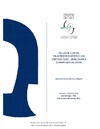Please use this identifier to cite or link to this item:
https://accedacris.ulpgc.es/jspui/handle/10553/74487
| Title: | Holocene coastal palaeoenvironments in Las Canteras beach, Gran Canaria (Canary Islands, Spain) | Other Titles: | Paleoambientes costeros del Holoceno en la playa de Las Canteras, Gran Canaria (Islas Canarias, España) | Authors: | Herrera Holguín, Adriana Catalina | Director: | Mangas Viñuela, José Menéndez González, Inmaculada |
UNESCO Clasification: | 250618 Sedimentología 250611 Mineralogía |
Keywords: | Holocene Palaeoenvironmnets Las Canteras beach |
Issue Date: | 2019 | Project: | Análisis de Procesos Naturales y Humanos Asociados A Los Sistemas Playa-Duna de Canarias Diagnóstico Ambiental de Los Sistemas de Dunas de Canaris Para la Elaboración de Modelos Sostenibles |
Abstract: | Las Canteras beach outcrops correspond to vestiges of Holocene palaeoenvironments that represent changes in the sea-level and climate conditions. Under detailed stratigraphic, sedimentological, mineralogical, petrographic, geochemical and dating studies it has been possible to identify and characterise a variety of facies from Las Canteras palaeoenvironments. The basal level is a beachrock (several calcarenite layers, dipping 8 to 15 degrees seawards and with isopaque LMC cement around sand grains of marine origin) formed through a rising sea level during the Present Interglacial stage (lower Holocene >6.6 ka). Afterwards, during middle Holocene (about 6.6 ka, 14C dating), coastal progradation phase or lower sea level (or both) could lead land emersion and formation of soil, with well-developed weathering and accumulation horizons and the presence of abundant terrestrial gastropods. Overhead, but only observed in the Central Arc of the beach, eolianite facies from cemented palaeocoastal dunes were identified (calcarenite levels, dipping around 20 degrees landward, and with phreatic LMC and vadose aragonite cement) formed in the upper Holocene (<6.6 ka). This eolian deposit represents the highest coast progradation or the end of low-stand sea level, with a more recent time than the palaeosol, whereas its cementation can be interpreted as the beginning of the sea level rise towards the current highstand sea level situation. | Department: | Departamento de Física | Faculty: | Facultad de Ciencias del Mar | Degree: | Máster Universitario en Oceanografía por la Universidad de Cádiz, la Universidad de Las Palmas de Gran Canaria y la Universidad de Vigo | URI: | https://accedacris.ulpgc.es/handle/10553/74487 |
| Appears in Collections: | Trabajo final de máster Restringido ULPGC |
En el caso de que no encuentre el documento puede ser debido a que el centro o las/os autoras/es no autorizan su publicación. Si tiene verdadero interés en el contenido del mismo, puede dirigirse al director/a o directores/as del trabajo cuyos datos encontrará más arriba.
Show full item recordPage view(s)
164
checked on Aug 10, 2024
Download(s)
141
checked on Aug 10, 2024
Google ScholarTM
Check
Share
Export metadata
Items in accedaCRIS are protected by copyright, with all rights reserved, unless otherwise indicated.
